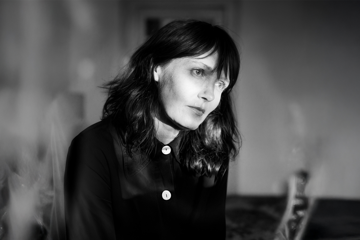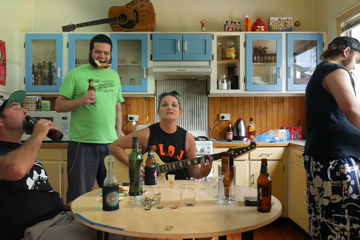 Sarah Blasko
Sarah Blasko"It just felt right to make a pop record," says Sarah Blasko. She recently previewed her new album Eternal Return at Sydney Opera House, and the wave of excitement from the interweb was impressive, if not still firmly focused on Blasko so far. References to her being 'captivating' and 'serenading the room' abounded (and no doubt, she did both), but on the record this new offering has a distinctly different touch.
"There were certain grand aims in the album in that I wanted to make it really tight, but on the other hand it was just a really natural thing," she continues of he process. "I think writing with other people was a chance to really focus on melody again and not be just alone writing in a room. So the key to the whole thing was really just that we would get together and have fun and have there be no pressure on the writing. And I think having no pressure meant that we were able to create more stuff than when you're intensely trying too hard in the process."
"I like the fact that as soon as you start writing about something it becomes fictionalised to a degree because things get accentuated."
The 'other writers' included hidden gems of the indie music world, Blasko's regular bandmates Ben Fletcher and David Hunt. The social writing process resulted in a sound is still driven by Blasko's vocal, but is grounded in a different way. "That's the great thing about songwriting," she explains. "On one hand it's a release and something that's really personal to you, and on the other hand it's playful and heightened and fiction, and I like the fact that as soon as you start writing about something it becomes fictionalised to a degree because things get accentuated. It's like, 'I didn't feel that, did I?' and it all changes as you create the song. It is about my life, but then of course you're always trying to relate, not in the sense of 'what do people want', because you can't ever know how other people are going to perceive it, but you want to resonate."
The unifying factor in the album is a collection on love gained rather than lost or eluded. It's a big call, as pop songs, particularly positive love songs, can be particularly slippy creatures. The album does give listener a chance to get their ciggie lighter out for a big ballad (skip to Say What You Want), but Blasko's take is contemporary, too. Her track I Wanna Be Your Man is unashamedly political given the obvious gender switch, something that Hoodoo Guru and Aus music legend Dave Faulkner noted particularly in his PR piece for the album. "It's easy for a woman to feel marginalised in the male-dominated world of the music industry," Faulkner wrote.
Don't miss a beat with our FREE daily newsletter
"I was actually trying not to make a statement, but it kind of scared me because it did feel like a statement song. But it was just being honest, and it happened." Blasko says.
The song is not necessarily about gender, but about knowing when to reveal a variety of emotions. "You know, I've had a few times where I've written songs and I've felt like I've wanted to shy away from putting certain things on the record. So on As Day Follows Night there's a song called Is My Baby Yours, which one of my friends always jokingly says is about teenaged pregnancy, which it isn't," she laughs. "But it scared me because it's a very honest song, it is what it is and there's nothing to hide behind. I Wanna Be Your Man is the same, it scared me in so far as it takes a lot of guts to be that outright and direct, and there's always a fear of just sounding like that angry person, which is really annoying."
"Sometimes I joke about my personality and I'm nice, nice, nice, and then all of a sudden NOT NICE."
Blasko's new song challenges the idea of what getting to be a man is in the music industry, something that much of the industry takes for granted (for obvious reasons). The song doesn't talk down her position as a woman in the field, but marks out that it's still a relatively marginal experience. "We [as women] should be allowed to be angry sometimes," she says of the song's inspiration. "And at the time that song and its point was really relevant to how I was feeling. When I was making this album, and a lot of other things that I do in my career, I'm often surrounded by men. The song's more about my own character than anything else — sometimes I joke about my personality and I'm nice, nice, nice, and then all of a sudden NOT NICE," she shouts with a smile, "and it's because you're trying to make people comfortable and then you just reach this point of exhaustion or whatever it is, but you just kind of snap. I feel that the song represents a little bit of how that feels. I wouldn't say all the time, but there's been times certainly over my working life where there have been moments, and lyrics in the song, when you relate to a man and it feels they're relating to you with the baggage of their relationship to their mother and their relationship to their partner, and it's like such a weird position to find yourself in. I'm sure men find that with women too, of course, but it does feel like a real man's world or boys' club at times."
Trainspotters will notice references back and forwards to old Blasko work and the older popular culture canon. Fans of old school showbiz will note in particular the mid album track Maybe This Time, which she shamelessly admits to having stolen the idea (and song title) from the musical Cabaret. "I think a lot of great pop music has a bit of humour and a bit of lightness of touch and I love those elements in that song [also called Maybe This Time]. The lyrics are classic, something like, 'Maybe this time I won't be a loser ... like the last time and the time before', and I love that it's talking about the current happiness but also the failure of the past. I think with my music in the past, I think the failures have certainly been there. As Day Follows Night is essentially a heartbreak record, so my love failures have been very written about before and informed me now."
Beyond the relatively new collaborative writing approach, Blasko was also keen to explore a different sound for her songs. While she's always been a songwriter partial to keys, this one takes on synth sounds with great energy. Children of 1980s morning music television will be particularly happy with this take, but she's careful to emphasise that it wasn't necessarily meant to be a retro record. "I didn't set out to make something that was totally '80s, so I get a bit nervous when people say 'it's an '80s album' because really, it's not, it's not!" Blasko giggles (and also slightly pleads). "The keyboards are the nostalgic element that links the sound to the '70s and '80s, because those keyboards were essentially built in that time. But the appeal for me was more the classic love songs are from the '70s and '80s, and that classic love album structure was really important to me. Even down to the simple headshot on the cover art, it was about that classic structure with strong melody and a direct lyrical approach."

















